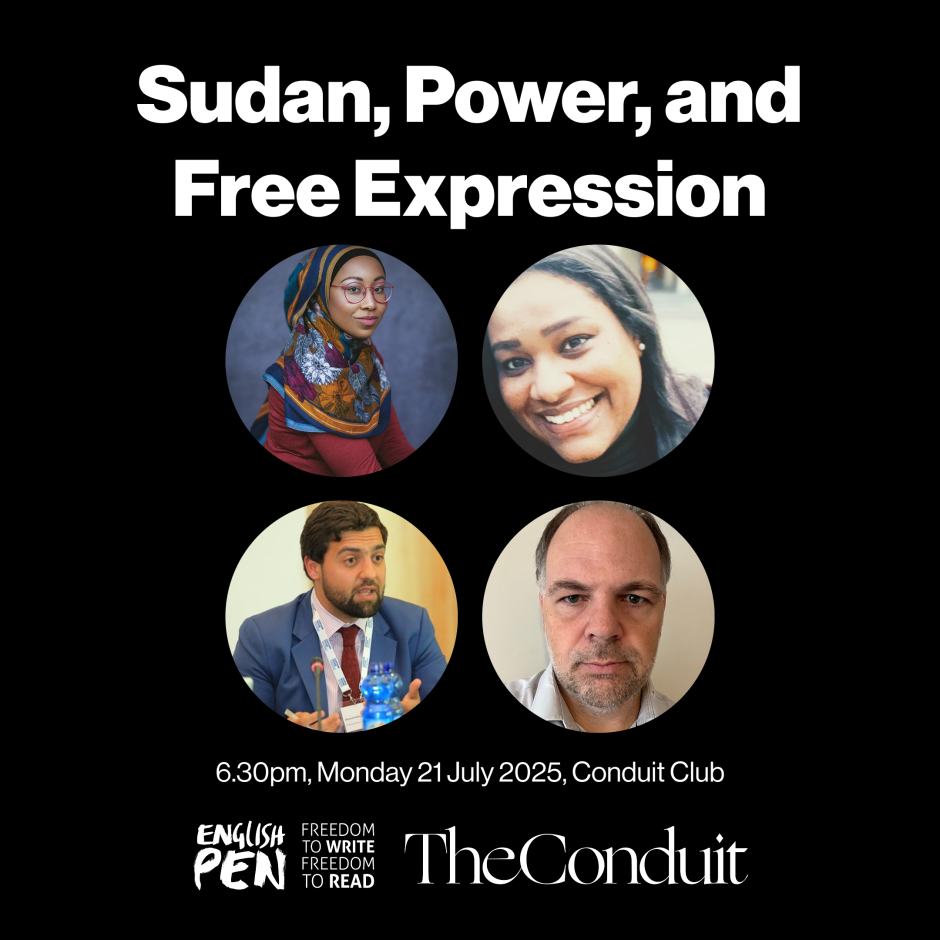
Sudan is currently experiencing what NGOs and IGOs have called “the worst humanitarian crisis in the world”, amid ongoing conflict beset by widely recognised atrocities and war crimes. But the severity of this reality has not been reflected by the limited political engagement of international governments, coverage in mainstream Anglophone media, and representation of Sudanese voices in UK public discourse.
Is Sudan being forgotten, or is it being ignored? What power structures contribute to this relative lack of institutional engagement? What are the free expression and media freedom issues at play – both in the UK and internationally? How do they intersect with international economic and political interests? How do they relate to an ideological and material move away from internationalism and global cooperation?
A panel of political, media, human rights and literary voices gather at The Conduit to discuss free expression in the UK in relation to the war in Sudan, and action that can be taken by media workers, politicians, and the public.
With Newsday presenter, author, and former BBC Sudan Correspondent James Copnall, global health and humanitarian consultant Dr Eva Khair, and senior research fellow with the Africa Programme at Chatham House Ahmed Soliman, in conversation with writer, broadcaster, and award-winning social advocate Yassmin Abdel-Magied. Hosted by English PEN, in partnership with the Conduit Club.
Speakers:
Yassmin Abdel-Magied (Chair) is a Sudanese diaspora writer, broadcaster, and award-winning social advocate. She has delivered workshops and keynotes in 25 countries, and her internationally acclaimed TED talk, “What Does My Headscarf Mean to You” was chosen as one of TED’s top 10 ideas. At age 16, Yassmin founded Youth Without Borders, leading it for nine years before founding Mumtaza, an organization focused on the empowerment of women of colour. She has published five books and has been awarded numerous awards for her writing and advocacy. In all her work, Yassmin advocates for transformative justice and a fairer, safer world for all.
Dr. Eva Khair is a British-Sudanese medical doctor and global health and humanitarian consultant, with over a decade of experience in Sudan-related crisis response, policy, and advocacy. Her work focuses on civic and human rights, social issues, and international development. She is the founder of the #Women4Sudan global solidarity campaign, highlighting the war’s impact, particularly on women and girls, and pushing for meaningful protection of civilians. Dr. Khair also leads the Sudan Transnational Consortium, a network of Sudanese professionals addressing conflict and humanitarian issues and advancing peacebuilding across Sudan, the region, and the diaspora. She works closely with international and grassroots partners to develop community-driven strategies. Dr Khair is also a health and human rights diplomat at a permanent mission to the United Nations.
Ahmed Soliman is a senior research fellow with the Africa Programme at Chatham House, where he leads programming on the Horn of Africa region. He has over a decade of experience in producing policy-relevant research that influences thinking on the region. His core research focus is on the political economy of Sudan and Ethiopia, as well as geopolitical connectivity across the Horn and Red Sea region. Ahmed is the author of several publications and comment pieces, and oversees the implementation of the institute’s research projects, activities and outputs on the Horn of Africa. He regularly contributes to media reporting on the region.
James Copnall was the BBC Sudan correspondent from 2009–12, covering conflicts, elections, the independence of South Sudan, music festivals, football matches and much more. He is the author of the critically acclaimed book A Poisonous Thorn in our Hearts, about Sudan and South Sudan. He was previously the BBC correspondent in Ivory Coast and Morocco. He currently presents the BBC World Service radio programme Newsday, which has been nominated for an AIB award for its coverage of the latest war in Sudan.